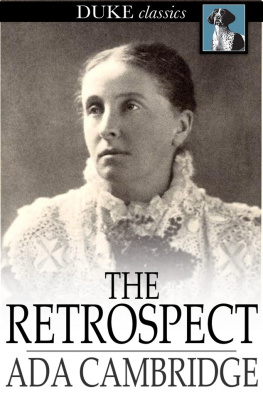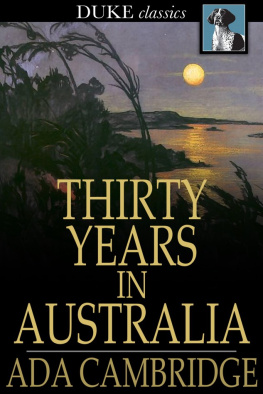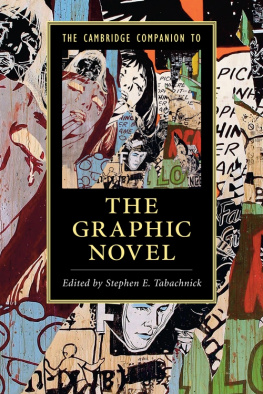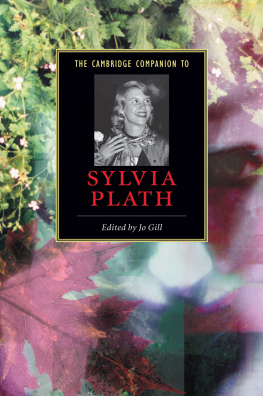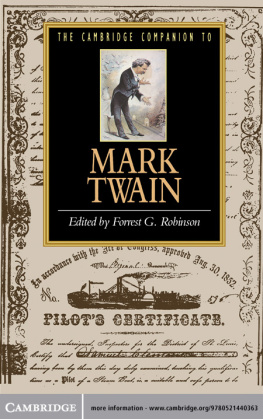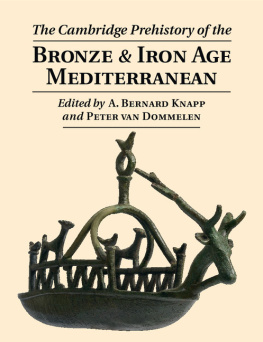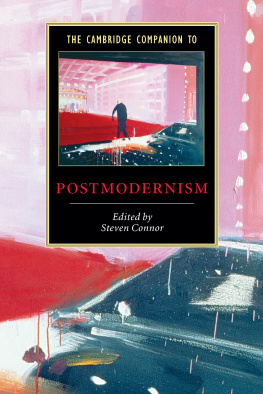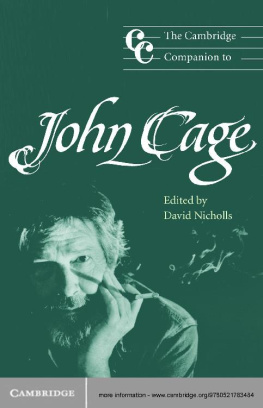Ada Cambridge - The Retrospect
Here you can read online Ada Cambridge - The Retrospect full text of the book (entire story) in english for free. Download pdf and epub, get meaning, cover and reviews about this ebook. year: 2013, publisher: Duke Classics, genre: Detective and thriller. Description of the work, (preface) as well as reviews are available. Best literature library LitArk.com created for fans of good reading and offers a wide selection of genres:
Romance novel
Science fiction
Adventure
Detective
Science
History
Home and family
Prose
Art
Politics
Computer
Non-fiction
Religion
Business
Children
Humor
Choose a favorite category and find really read worthwhile books. Enjoy immersion in the world of imagination, feel the emotions of the characters or learn something new for yourself, make an fascinating discovery.
- Book:The Retrospect
- Author:
- Publisher:Duke Classics
- Genre:
- Year:2013
- Rating:4 / 5
- Favourites:Add to favourites
- Your mark:
- 80
- 1
- 2
- 3
- 4
- 5
The Retrospect: summary, description and annotation
We offer to read an annotation, description, summary or preface (depends on what the author of the book "The Retrospect" wrote himself). If you haven't found the necessary information about the book — write in the comments, we will try to find it.
Against all odds, English-born Ada Cambridge rose to prominence as a well-known writer and essayist during the 38 years she spent in Australia. This compelling memoir takes a look at her time in both countries; she spins her memories and impressions of each into a thought-provoking exploration of the ideas of home, homesickness, exile, and return.
The Retrospect — read online for free the complete book (whole text) full work
Below is the text of the book, divided by pages. System saving the place of the last page read, allows you to conveniently read the book "The Retrospect" online for free, without having to search again every time where you left off. Put a bookmark, and you can go to the page where you finished reading at any time.
Font size:
Interval:
Bookmark:

First published in 1912
ISBN 978-1-62013-320-0
Duke Classics
2013 Duke Classics and its licensors. All rights reserved.
While every effort has been used to ensure the accuracy and reliability of the information contained in this edition, Duke Classics does not assume liability or responsibility for any errors or omissions in this book. Duke Classics does not accept responsibility for loss suffered as a result of reliance upon the accuracy or currency of information contained in this book.
TO
MY FRIENDS, KNOWN AND UNKNOWN
WHO WERE YOUNG AND HAVE GROWN OLD WITH ME
I DEDICATE THIS BOOK
There was a gap of thirty-eight years, almost to a day, between mydeparture from England (1870), a five-weeks-old young bride, and myreturn thither (1908), an old woman. And for about seven-eighths of thatlong time in Australia, while succeeding very well in making the best ofthings, I was never without a subconscious sense of exile, a chronicnostalgia, that could hardly bear the sight of a homeward-bound ship.This often-tantalised but ever-unappeased desire to be back in my nativeland wore the air of a secret sorrow gently shadowing an otherwise happylife, while in point of fact it was a considerable source of happinessin itself, as I now perceive. For where would be the interest andinspiration of life without something to want that you cannot get, butthat it is open to you to try for? I tried hard to bridge the distanceto my goal for over thirty years, working, planning, failing, startingagain, building a thousand air-castles, more or less, and seeing themburst like soap-bubbles as soon as they began to materialise; then Igave up. The children had grown too old to be taken; moreover, they hadattained to wills of their own and did not wish to go. One had fallen tothe scythe of the indiscriminate Reaper, and that immense loss dwindledall other losses to nothing at all. I cared no more where I lived, solong as the rest were with me. In England my father and mother, who hadso longed for me, as I for them, were in their graves; no old home wasleft to go back to. I was myself a grandmother, in spite of kindly andeven vehement assurances that I did not look it; more than that, Icould have been a great-grandmother without violating the laws ofnature. At any rate, I felt that I was past the age for enterprises. Itwas too late now, I concluded, and so what was the use of fussing anymore? In short, I sat down to content myself with the inevitable.
I was doing it. I had been doing it for several years. The time had comewhen I could look out of window any Tuesday morning, watch ahomeward-bound mail-boat put her nose to sea, and turn from thespectacle without a pang. The business of building air-castlesflourished, as of yore, but their bases now rested on Australian soil.What was left of the future was all planned out, satisfactorily, evendelightfully, and England was not in it.
Then was the time for the unexpected to happen, and it did. A totallyundreamed-of family legacy, with legal business attached to it, calledmy husband home. Even then it did not strike me that I was called too;for quite a considerable time it did not strike him either. But therebefell a period of burning summer heat, the intensity and duration ofwhich broke all past records of our State and established it as ahistoric event for future Government meteorologists; the weaklings ofthe community succumbed to it outright or emerged from it physicallyprostrate, and I, who had encountered it in a "run-down" condition, wasof the latter company. The question: "Was I fit to be left?" obtrudeditself into the settled policy: it logically resolved itself into thefurther question: "Was I fit to go?" There was nothing whatever toprevent my going if I could "stand" it, and a long sea-voyage had beendoctors' prescription for me for years. Mysteriously and, as it were,automatically, I brisked up from the moment the second question waspropounded, and before I knew it found myself enrolled as a member ofthe expedition. The two-berth cabin was engaged; travelling trunks, andclothes to put in them, bestrewed my bedroom floor. I was going homeatlast!
And was it too late? Had I outlived my long, long hope? Not a bit of it.I had outlived nothing, and it was exactly and ideally the right time."You will be disappointed," said more than one of my travelled oldfriends, who had known the extravagance of my anticipations. "It will besad for you, finding all so strange and changed." "You will feeldreadfully out of it, after so many years." "You will be verylonely"thus was I compassionately warned not to let a too sanguinespirit run away with me. They were all wrong. I never had adisappointment: nothing was sad for me, of all the change; no one couldhave been less out of it, or less lonely. Every English day of the wholesix months was full of pleasure; I was not even bored for an hour. At notime of my life could I have made the trip with a lighter heart (beingassured weekly that all was well behind me). Children would have meanta burden, however precious a burden, and had I gone in my parents'lifetime it would have been with them and me as our ship's captain saidit was with his wife during his brief sojourns with her; for half thetime she was overwrought with the joy of his return, and for the otherhalf miserable in anticipation of his departure, so that he never knewher in her normal state. That my father and mother had long been dead,and that the tragedies of home love and loss, with which I was sofamiliar, were not pressing close about me, probably accounted more thananything else for my being so well and happy. Also, it is not until awoman is sixty, or thereabouts, that she is really free to enjoyherself.
Well! I never was so well since I was born. The long sea-voyage did allthat was asked of it, and incidentally brought home to me the truth ofthe old adage that silver lines all clouds. "If only we were not so faraway!" had been my inward wail for eight and thirty years. "If only wehad emigrated to Canada, or South Africa, or almost any part of theBritish Empire but this! Then we might have flown home every few yearsas easily as we now go from Melbourne to Sydney, and at no moreexpense." I have the same regret, intensified, now that I am back inAustralia again. But there is no gain without its corresponding loss.Not only might the joys of England after exile have become staled bythis time, but a voyage of a week or two would not have prepared me tomake the most of them. I am convinced that years of health and life aregiven to those who, at the right juncture, can afford six weeks ofsea-travel at a stretch, and they may have been given to me and mycompanion; I quite believe so. Each of us was a stone heavier at the endof our holiday than at the beginning, and in the interval we forgot thatwe were a day over twenty-five.
Consider for a moment the perfect adjustment of the conditions to theneeds of the invalid with no disease but exhaustion. I pass over thespecial favours vouchsafed to me, in idyllic weather and tranquil seas,and the mothering of a devoted stewardess who is my friend for life;also in finding quiet and pleasant company in a saloon party of buteighteen. That sort of luck cannot be purchased even with a first-classsteamer ticket, nor is it necessary to the efficacy of the treatment.Take only the itinerarythat of the Suez route at a suitable seasonasit may be observed by anybody.
First, the run across the Indian Oceanin the case of the mail-steamersfrom Adelaide to Colombo, in our case from Adelaide to Aden. Three wholeweeks, without a break, without an incident, if all goes well. I hadnever imagined the sea could be so blank as it presented itself to us onthis first section of our voyage. Ships may have passed in the night,but I saw none by day; no land, no birds, no whales, no phosphorescentwakes, no anything, except sea and sky and lovely sunsets. It may havebeen monotonous, but it was monotony in the right place. It brought tome, at the outset, that complete rest from all effort and excitementwhich was the necessary preliminary to recovery and repair. I reposed onmy comfortable lounge from morn till eve, playing with a trifle ofneedlework (too stupid with blissful torpor to read, while thestrangeness of quite idle hands would have induced the fidgets,sea-drugged as I was). I ate, and slept, and basked, like a soullessanimal; forgot there were such things as posts and newspapers, asdinner-planning and stocking-mending, as calls and committee-meetings;forgot that I was the mother of a family, and had abandoned it for thefirst time in history; forgot whether I was ill or well, or had nervesor not; and thus soaked and steeped and soddened in peace, insensiblyrenewed and established my strength, not patching it anyhow just tocarry on with, as one does on land, with a casual week at awatering-place or in the mountains, but unhurriedly, uninterruptedly,solidly, rebuilding it from the bottom up.
Font size:
Interval:
Bookmark:
Similar books «The Retrospect»
Look at similar books to The Retrospect. We have selected literature similar in name and meaning in the hope of providing readers with more options to find new, interesting, not yet read works.
Discussion, reviews of the book The Retrospect and just readers' own opinions. Leave your comments, write what you think about the work, its meaning or the main characters. Specify what exactly you liked and what you didn't like, and why you think so.

